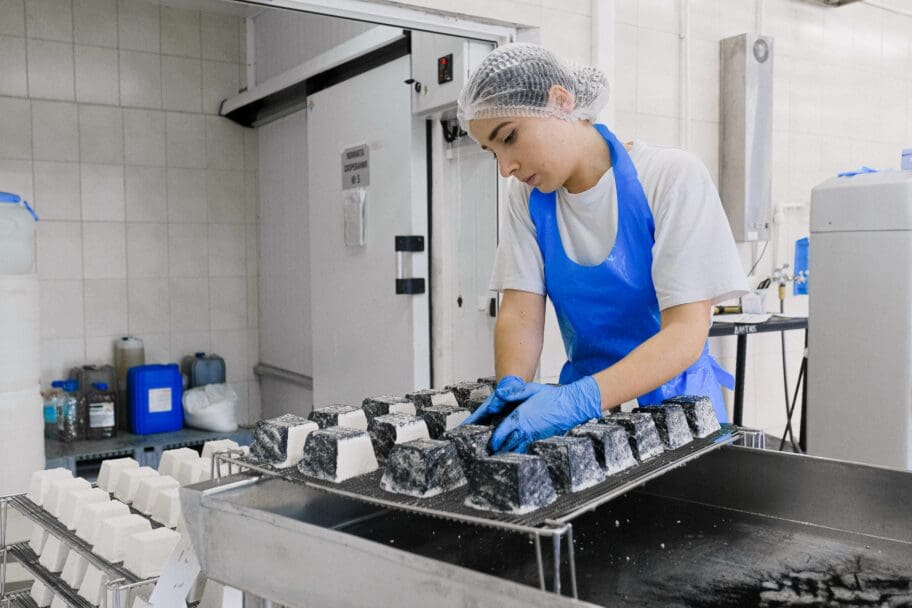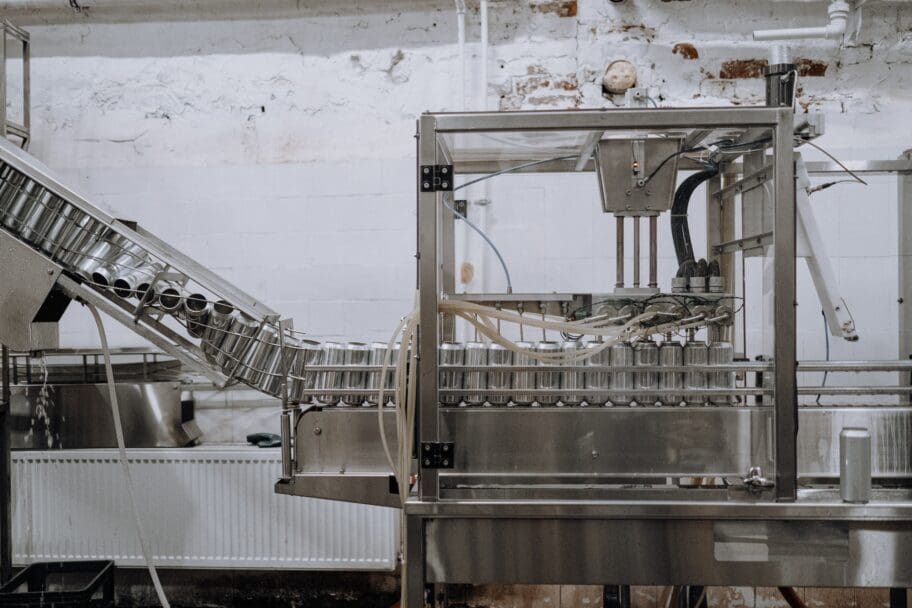Dear Readers,
The food industry is witnessing a revolution in sorting fresh produce, fueled by Artificial Intelligence (AI), automation, and robots. Artificial intelligence has the potential to automate food production processes, enhancing customer dining experiences with virtual ordering assistants and streamlining foods' supply chain management. Sorting fresh produce and packaging foods also plays a significant role in reducing food waste significantly, thus lessening the environmental impact while maintaining quality control in the industry.
Relevant data and key insights indicate that artificial intelligence, particularly computer vision, holds immense promise for addressing critical issues and reaping benefits in today's fast-paced world, shaping our future. This article aims to provide key insights into the various ways AI in food industry and computer vision are reshaping the industry, particularly in relation to products.

AI Applications: Transforming Food Processing
Artificial intelligence applications are revolutionizing the food industry, enhancing efficiency and quality throughout the food production process with AI products. These machines utilize computer vision, significantly transforming operations.
Automation in Food Processing
Food companies are leveraging artificial intelligence and computer vision for automating repetitive tasks in machines and products. The application of AI algorithms enables:
-
Efficient sorting of fresh produce.
-
Streamlined processing of food products.
-
Increased productivity.
Automated tasks, powered by machines and artificial intelligence, not only save time but also reduce human errors. Utilizing computer vision, these processes ensure consistent quality across all food products.
Precision Farming with AI
Artificial intelligence-based sensors, a type of intelligent machines, have found their place in precision farming, a notable industry trend among food product businesses. These sensors help in:
-
Monitoring soil health.
-
Optimizing water usage.
-
Predicting crop yields.
These advancements in industry machines contribute to sustainable practices while maximizing the quality and output of products, essential for meeting global food demands.
Quality Control through Machine Learning
Artificial intelligence and machine learning algorithms play a crucial role in the industry, particularly in maintaining the quality of food products during the production process using machines. They facilitate:
-
Accurate detection of contaminants or defects.
-
Consistent classification and grading of products.
-
Real-time monitoring and adjustment of processing parameters.
Such capabilities ensure that consumers receive safe and high-quality food products from industry companies, where machines are integral to the manufacturing process.
Predictive Maintenance with AI
Predictive maintenance, a significant application of artificial intelligence in the food industry, particularly impacts machinery used in food transportation and processing. This AI-driven process allows companies to better manage their products by leveraging data. By analyzing patterns in operational data, predictive models can:
-
Identify potential failures before they occur.
-
Schedule timely maintenance activities.
-
Minimize downtime and associated costs.
This ensures uninterrupted operations, vital for any company's success within the competitive landscape of the food industry, where quality data and artificial intelligence are key.
Enhancing Customer Experience with AI
AI is a game-changer in the food industry. It enhances customer experience and improves service quality.
Personalized Recommendations
Artificial intelligence helps to understand customer preferences. Predictive analytics and machine learning are used to offer:
-
Suggestions based on dietary habits
-
Food choices that align with customers' health goals
This personal touch makes customers feel valued, enhancing their overall experience with food brands. It also improves food quality perception, beneficial for food businesses offering various food products.
Virtual Ordering Assistants
Artificial intelligence in the form of virtual ordering assistants is revolutionizing the way customers order food, offering help to companies in the industry. These AI-powered tools:
-
Help customers place orders via phone calls
-
Answer queries about menu items
-
Provide real-time updates on order status
This seamless food processing and food sorting process in food businesses eliminates waiting time, enhancing customer's dining experience and ensuring food safety.
Real-Time Order Tracking
With AI technology, food companies in the food industry can now provide real-time tracking of food products orders, enhancing food safety in restaurants. Customers can monitor their food products' progress from food processing to delivery in food companies, which adds transparency and builds trust in food safety.
Interactive Menus through AR
Augmented Reality (AR) is stepping into the food industry, offering interactive menus that help food companies streamline food production for customers.

AI and Cost Reduction in Food Production
AI significantly impacts food production by optimizing resource allocation. Predictive analytics, a highlight of AI, enhances efficiency in the distribution of resources and can help food companies in the food industry reduce food waste. It predicts:
-
Quality requirements
-
Inventory needs
-
Pricing adjustments
This focus on optimization results in significant cost savings.
Automation is another advantage of AI in food production. It helps food companies in the food industry reduce labor costs and food waste by taking over repetitive tasks.
-
Sorting products
-
Packaging goods
-
Cleaning facilities
The result? A reduction in high costs associated with manual labor.
AI also minimizes downtime through predictive maintenance tools. These smart systems help food companies in the food industry by forecasting potential machine failures, allowing for timely repairs before breakdowns occur.
|
Maintenance Type |
Time Required |
Costs |
|---|---|---|
|
Reactive Maintenance |
High |
High |
|
Predictive Maintenance (AI) |
Low |
Low |
Lastly, AI integration into food production systems not only helps the industry but also promotes energy-efficient operations. Smart systems in the food industry optimize energy usage during production processes, helping food companies reduce overall operational costs.
Ensuring Compliance through AI: Food Safety
AI in the food industry plays a crucial role in maintaining safety compliance, offering help in ensuring standards are met. It does this by:
-
Automated Monitoring in the Food Industry: Smart sensors and cameras offer food companies automated monitoring for hygiene standards compliance, providing essential help. This industry solution reduces human errors, ensuring cleanliness and adherence to food safety regulations, thereby offering help in maintaining standards.
-
Contaminants Detection in the Food Industry: Real-time detection of contaminants is possible using machine vision technology, which can help significantly. This advancement helps the food industry by increasing quality control, promptly identifying safety hazards before they pose a risk.
-
Traceability Enhancement: AI enhances traceability, crucial for product safety. The food industry ensures rules are followed from farm to fork, minimizing risks associated with breaches of safety standards and providing help to maintain safety.
-
Risk Prediction & Prevention in the Food Industry: Data analysis can help enable risk prediction and prevention. By analyzing patterns and trends in the food industry, potential issues can be identified early on, allowing proactive measures to help mitigate these risks.
The use of AI not only simplifies the security service in the food industry but also significantly improves the effectiveness of detecting any deviation from established safety standards, thereby helping to ensure compliance. For instance:
-
A smart sensor helps detect an anomaly in temperature during food industry storage.
-
The system immediately alerts the quality control team in the food industry about the potential risk, providing crucial help.
-
The team takes necessary action to help avoid spoilage, ensuring food safety.
This example shows how AI helps maintain high-quality standards while complying with stringent food safety regulations. With such advancements in technology, we can expect help in reducing outbreaks related to foodborne illnesses due to improved detection capabilities and enhanced traceability facilitated by AI solutions in the food industry.
AI in Food Industry: Role of AI in Supply Chain Management
AI plays a pivotal role in supply chain management. It provides help and solutions for various challenges in the food industry, enhancing efficiency and transparency.
Demand Forecasting
AI aids in demand forecasting in the food industry, enabling businesses to manage inventory effectively and help meet customer needs. Utilizing historical data and trend analysis, AI predicts future food sales patterns to help businesses.
-
Accurate stock level predictions
-
Reduced overstock and stockouts
-
Improved customer satisfaction
These benefits result from precise demand forecasting by AI.
Route Optimization
AI also contributes to efficient food delivery systems, helping through route optimization.
-
Analyses traffic patterns
-
Predicts potential delays
-
Suggests optimal routes
In this way, AI ensures timely food deliveries while minimizing fuel consumption, offering help in logistics efficiency.
Supplier Evaluation
Machine learning models are used for food supplier evaluation and selection, which can help streamline the process.
-
Rating suppliers based on performance metrics
-
Identifying reliable suppliers
-
Mitigating risks associated with supplier reliability
Through these methods, businesses can select the best suppliers.
Real-time Tracking
AI enhances transparency in food supply chain management, helping via real-time tracking and tracing capabilities.
-
Provides real-time location of goods
-
Monitors temperature conditions for perishable items
-
Detects any deviations or disruptions immediately
This increased visibility leads to improved decision-making processes.
Reducing Food Waste: An AI Perspective
Predictive Analytics and Perishable Inventory
AI in the food industry is making significant strides. Computer vision and machine learning are used to improve perishable food inventory management and help with efficiency. These food technologies offer insights that help human workers manage stock better, reducing food waste. For example:
-
Trend forecasting models predict demand, adjusting orders accordingly.
-
Sensor technology identifies food preferences and can help based on color, texture, and other factors.
Smart Packaging
Smart packaging also plays a key role in helping to minimize food waste. The sensor technology helps indicate the freshness levels of food products. This way, food consumers and retailers can make informed decisions about product usability.
Machine Learning Models
Machine learning models are crucial in identifying wastage patterns. They provide solutions by:
-
Recognizing trends in waste production.
-
Suggesting effective ways to reduce surplus.
-
Assisting human workers with actionable insights.
Intelligent Systems for Surplus Food
Finally, AI assists in managing surplus food effectively through intelligent systems. These systems facilitate donation or recycling of excess food using robots equipped with computer vision capabilities:
-
Robots identify edible surplus food suitable for donation.
-
Non-edible waste is directed towards recycling processes.
In essence, AI provides an efficient way to combat food waste in the industry by offering predictive analytics for inventory management, smart packaging options, machine learning models for wastage pattern identification, and intelligent systems facilitating effective use of surplus food.

The Dawn of a New Era in the Food Industry with AI
The food industry is rapidly evolving, thanks to the integration of Artificial Intelligence (AI) in various aspects ranging from processing to customer experience. Not only does AI enhance efficiency and reduce costs in the food industry, but it also plays a pivotal role in ensuring compliance with food safety standards and managing food supply chains effectively. Furthermore, AI's potential in reducing food waste underscores its significance for a sustainable future.
As we stand on the brink of this technological revolution, it becomes imperative for stakeholders in the food industry to embrace these advancements. Whether you're a food manufacturer looking to streamline your production process or a food retailer aiming to provide an enhanced customer experience, leveraging AI can equip you with the necessary tools to stay ahead of the curve in the food industry. It's time to step into the future and harness the power of AI for a more efficient and sustainable food industry.
FAQs
How can AI improve my restaurant's customer service?
AI can greatly enhance your restaurant's food service by enabling personalized food recommendations based on customers' past orders or dietary preferences. Chatbots in the food industry can provide instant responses to queries, improving overall customer satisfaction levels.
Can implementing AI help reduce costs in my food production business?
Absolutely! By automating various processes in the food industry such as sorting, packaging, and quality control checks, AI can significantly reduce labor costs. Moreover, predictive analytics powered by AI can optimize food inventory management and prevent overproduction in the food industry.
Is it possible for AI to ensure compliance with food safety regulations?
Yes! Advanced image recognition systems powered by AI can detect anomalies during production that may compromise food safety standards. This ensures compliance with food regulations while minimizing risks associated with human error in food handling.
How does AI contribute towards reducing food waste?
AI helps predict demand accurately which aids in effective inventory management thus preventing overproduction - one of the major causes of food waste. Smart sensors equipped with AI technology can monitor the freshness of stored food and alert when spoilage is imminent.
Can AI improve supply chain management in the food industry?
Indeed! AI algorithms can analyze vast amounts of data to predict food demand, optimize food logistics, and ensure timely delivery of food products. This leads to improved efficiency and reduced costs in the supply chain.

Article by
Titus Mulquiney
Hi, I'm Titus, an AI fanatic, automation expert, application designer and founder of Octavius AI. My mission is to help people like you automate your business to save costs and supercharge business growth!
